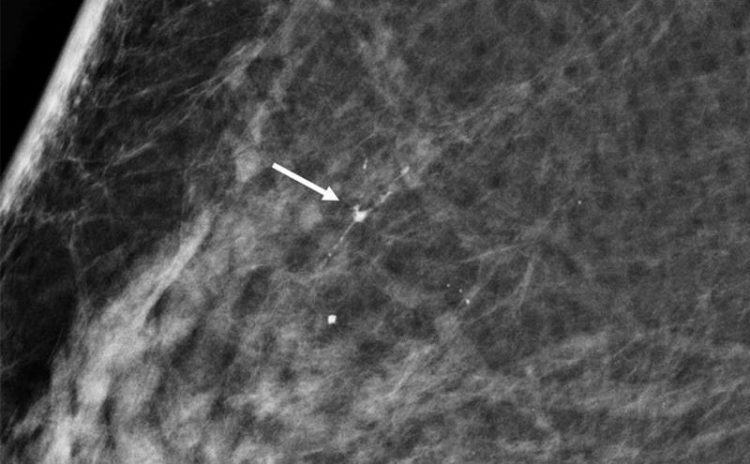Breast cancer discovered in its preliminary stages in mammography screening is usually aggressive

Digital screening mammography with fine calcifications (arrow) which resulted in the diagnosis of an aggressive preliminary stage of breast cancer.
In the latest screening programme carried out in North Rhine-Westphalia, data were evaluated pertaining to around 714,000 women who had regularly taken part in the programme up to three times, with a two-year interval between each screening.
Breast cancer at a preliminary stage was discovered in 1,970 women, and in half of these cases it was present in its most aggressive form in the follow-up screening.
The results indicate that there might be far fewer overdiagnoses in mammography screening than has been discussed so far. Overdiagnoses are cases of breast cancer that have been discovered which would not have become apparent during the lifetime of a woman who had not undergone any screening.
The greatest probability of an overdiagnosis being made is ascribed to the “harmless” preliminary stages of breast cancer which can develop into invasive breast cancer only more than ten years later.
On the basis of a large quantity of data, the interdisciplinary team of researchers at the University of Münster has shown that most of the preliminary stages of breast cancer discovered in subsequent rounds of screening are aggressive and that their development is far more quickly than of the more harmless forms.
Therefore, as a percentage they increase in repeated screenings. This means, conversely, that it is above all women who regular take part in mammography screening who benefit in particular.
The reason is that if the preliminary stages of the breast cancer are aggressive, they are often discovered as a result of this form of early detection before they can develop into invasive, aggressive breast cancer.
Original paper:
Weigel S, Khil L, Hense HW, Decker T, Wellmann J, Heidrich J, Sommer A, Heidinger O, Heindel W.
Detection Rates of Ductal Carcinoma in Situ with Biennial Digital Mammography Screening: Radiologic Findings Support Pathologic Model of Tumor Progression.
Radiology. 2018 Feb; 286(2): 424-432 [Epub 2017 Nov 6]. Doi: 10.1148/radiol2017170673
Media Contact
More Information:
http://www.ukmuenster.deAll latest news from the category: Health and Medicine
This subject area encompasses research and studies in the field of human medicine.
Among the wide-ranging list of topics covered here are anesthesiology, anatomy, surgery, human genetics, hygiene and environmental medicine, internal medicine, neurology, pharmacology, physiology, urology and dental medicine.
Newest articles

Properties of new materials for microchips
… can now be measured well. Reseachers of Delft University of Technology demonstrated measuring performance properties of ultrathin silicon membranes. Making ever smaller and more powerful chips requires new ultrathin…

Floating solar’s potential
… to support sustainable development by addressing climate, water, and energy goals holistically. A new study published this week in Nature Energy raises the potential for floating solar photovoltaics (FPV)…

Skyrmions move at record speeds
… a step towards the computing of the future. An international research team led by scientists from the CNRS1 has discovered that the magnetic nanobubbles2 known as skyrmions can be…





















